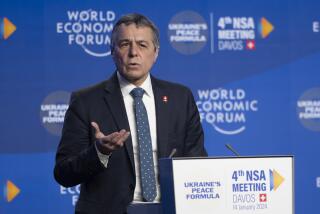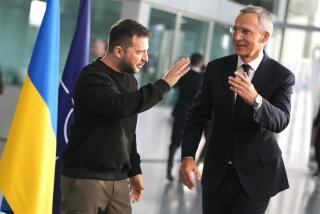Russia and the West Still at Odds Over Bosnia : Balkans: Contact Group differs on how to approach warring parties, but Moscow meeting may bolster Yeltsin’s foreign minister.
MOSCOW — Diplomats of the chronically discordant Contact Group on Bosnia deemed their Tuesday session here a last chance to forge a united strategy in advance of a Balkan peace conference in the United States later this month, but they scattered still sharply divided on vital issues.
Despite vows to intensify mediation efforts and vague claims of narrowing their internal differences, negotiators from the five-nation team trying to broker peace in the former Yugoslav federation conceded that they remained at odds over how to approach the warring parties.
“Do not assume we are going to sail into a peace agreement,” U.S. envoy Richard Holbrooke warned after the two-day session that appeared more successful in salving Russia’s domestic political frictions than in boosting the prospects for Balkan peace.
“There is much too much of an assumption that we have peace around the corner,” Holbrooke told journalists. “Peace is not around the corner.”
The main conflict plaguing the Contact Group for the past few months has been the irreconcilable policies espoused by Russia and the other four countries in the forum--the United States, Britain, France and Germany.
As fellow members of the North Atlantic Treaty Organization, the four Western nations are united in their push for a NATO-commanded “implementation force” to monitor a peace accord in the Balkans should one result from the conference beginning Oct. 31 in the United States.
But Russian Foreign Minister Andrei V. Kozyrev reiterated the Kremlin’s strong opposition to an all-NATO command, calling instead for rotating authority over the proposed multinational force.
U.S. military policy, however, forbids U.S. troops from participating in foreign operations unless commanded by U.S. or NATO officers, and Holbrooke indicated that there would be no compromise on that position.
“The United States, for its part, will not allow any agreement and will not agree with any agreement that violates our chain of command,” said Holbrooke, an assistant U.S. secretary of state, at a news conference after meetings that focused on the difficulties of merging Russian and NATO troops in a joint peace-enforcement effort.
The Contact Group, created two years ago after previous U.N.- and European-led peace efforts failed, has been shackled by disagreements among its members over the use of military force against combatants in Bosnia-Herzegovina and by widely divergent views on the relative responsibility of the warring parties for the worst bloodshed in Europe since World War II.
*
When NATO warplanes began a punitive bombing campaign against Bosnian Serb nationalists after the latest artillery massacre of civilians in the capital, Sarajevo, Russian politicians leaped to the defense of the targeted Serbs. An official government statement last month accused NATO of waging “genocide” against the Bosnian Serbs, deemed by Western powers to be primarily responsible for instigating the violence convulsing the former Yugoslav federation.
Russians share Slavic roots and the Christian Orthodox faith with Serbs and have campaigned doggedly against U.N. sanctions imposed on their historical allies.
While the Contact Group session appeared to have made little progress in patching up the internal rifts, it probably succeeded in showing support for politically embattled Kozyrev and the moderate position he now occupies in isolation from his Kremlin colleagues.
*
President Boris N. Yeltsin has publicly lamented the failure of Russian policy to dissuade NATO from its air strikes against the Bosnian Serbs, and the Duma, the lower house of Parliament, has demanded Kozyrev be fired.
The soft-spoken foreign minister has appeared on the defensive in recent weeks, acknowledging in a Sunday television interview that he has virtually no allies in Yeltsin’s inner circle and that Russia has little clout in the international arena because of its dire economic straits.
Whereas the United States invests $5 billion a year in aid to Middle East countries, “we cannot even support our embassies there,” Kozyrev complained to an interviewer during the “Itogi” political analysis television program.
European Union mediator Carl Bildt lavishly praised Russia’s contribution to the Balkan peace process, crediting Moscow with playing the key role in securing a nearly week-old Bosnian cease-fire by providing gas to fuel-strapped Sarajevo.
By trumpeting Moscow’s contributions and playing down its fundamental differences with the Western nations, the Contact Group session here may have taken some of the steam out of a campaign to oust Kozyrev and replace him with a more nationalist and anti-Western figure.
More to Read
Sign up for Essential California
The most important California stories and recommendations in your inbox every morning.
You may occasionally receive promotional content from the Los Angeles Times.











